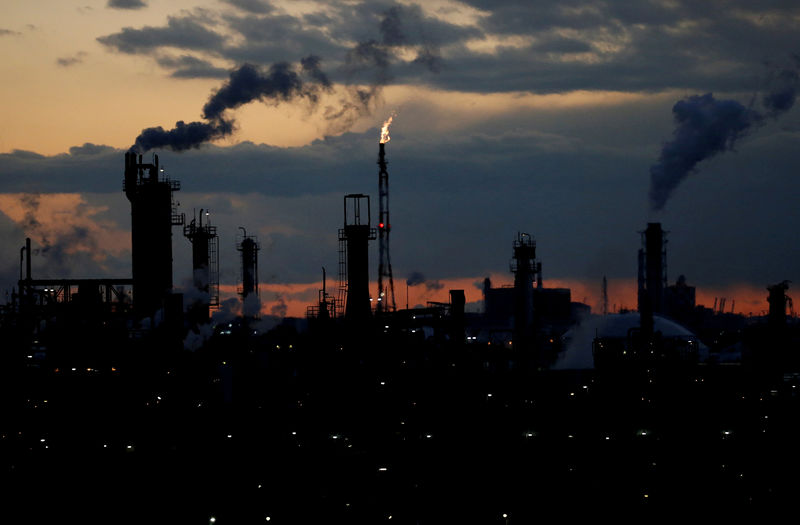By Shrutee Sarkar and Rahul Karunakar
BENGALURU (Reuters) - A steeper decline in global economic growth still more likely than a synchronized recovery, even as multiple central banks dole out rounds of monetary easing, according to economists polled by Reuters in recent weeks.
While a reprieve from escalating U.S.-China trade tensions has pushed stocks back near record highs, a record $17 trillion of bonds have negative yields and a key market signal of U.S. recession is still flashing red.
After the European Central Bank cut its deposit rate further into negative territory and announced it would resume its asset purchases, the Bank of Japan - which has essentially been running easy policy for two decades - and the Federal Reserve are due to cut rates again as early as next week.
"More central banks around the world, led by the Fed and the ECB, are cutting rates. Fiscal stimulus is imminent, too, but yield curves still seem to be signaling recession," wrote Janet Henry, global chief economist at HSBC, in a note to clients.
Growth and inflation forecasts for most major economies appear to be on the wane or at best holding at historically modest rates, according to Reuters polls of over 500 forecasters from around the world taken this month.
Reuters Poll: 2020 economic growth forecast revisions from July survey https://fingfx.thomsonreuters.com/gfx/polling/1/629/625/GG.png
While almost all major central banks surveyed are forecast to ease policy next year, 71% of 177 economists said in response to an additional question a deeper global economic downturn was more likely than a synchronized rebound.
That view has turned dramatically from just six months ago when economists were almost evenly split on what was more likely. Optimism shared among many analysts that U.S.-China trade tensions would cool off appears to have evaporated.
And Britain's exit from the European Union, set for yet another delay, remains a concern for sentiment more broadly should it become disorderly.
"Most of the plausible risks we see are to the downside, including a possible no-deal Brexit in Q1 2020, another breakdown in U.S.-China trade negotiations," noted Ajay Rajadhyaksha, head of macro research at Barclays (LON:BARC), adding: "by contrast, we do not see upside risks."
Analysis of Reuters polls taken this month covering 46 economies showed the growth and inflation outlook over the next two years for around 90% of them was either downgraded from the previous poll or left unchanged.
The consensus for global economic growth next year was cut to 3.1%, the lowest since polling began, from 3.3% in the previous poll in July and lower than the International Monetary Fund's latest downgraded forecast of 3.4%.
The range of forecasts showed lower highs and lows, suggesting the global growth slowdown will worsen next year.
The outlook was not very different for emerging market. From China to Turkey, from South Africa to major economies in Latin America, growth forecasts for next year were downgraded despite predictions for policy easing.
"At the heart of the slowdown is a downturn in global manufacturing ... the trade war isn't the primary cause per se, but it certainly isn't helping, nor is it going away," said Jan Lambregts, global head financial markets research at Rabobank.
Referring to the policy response to that slowdown, he said: "The ingredients should be clear - more central bank rate cuts and a come-back of unconventional policy measures. The unconventional has become conventional, after all."
While nearly 70% of economists who answered a separate question said most major central banks would be able to avoid a sharp global economic slowdown over the coming year, around one-third argued monetary policy could only do so much.
Indeed, it appears the effectiveness of so-called unconventional policy has waned as it has become the norm.
The ECB's latest round of easing is not expected to significantly help in bringing tepid inflation in the euro zone back to target and economists said the risk of a recession there over the next two years had increased.
"Key risks remain unresolved. Moreover, downside risks have become more prominent in recent months. The world economy continues to decelerate, and we expect global growth to remain weak well into 2020 while avoiding an outright recession," noted Barclays' Rajadhyaksha.
(Polling and reporting by the Reuters Polls team in Bengaluru and bureaus in Shanghai, Tokyo, London, Oslo, Istanbul, Johannesburg, Brasilia, Mexico City, Lima, Buenos Aires, Bogota, Caracas and Santiago; Editing by Ross Finley, Larry King)
